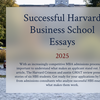If President Clinton has his way, 1995 may turn out to be a very good year for students seeking financial aid. But if Republican Congressional leaders have their way, students may find themselves paying more than they had expected for college and graduate school.
As part of his Middle Class Bill of Rights, President Clinton wants to increase student financial assistance.
Republicans, as part of their Contract with America, want a balanced budget, which may mean significant cuts in student assistance programs.
And as the budget drama plays out in Washington, Harvard students will be left in limbo with the University as their only advocate.
"We're talking about money that could be gone in September," says Clare M. Cotton, president of the Association of Independent Colleges and Universities in Massachusetts.
Although President Clinton and some Senate Democrats have proposed a tax deduction of up to $10,000 for college tuition payments, University officials are worried about House Budget Committee proposals to cut financial assistance.
Rep. John R. Kasich (R-Ohio), chair of the committee, says nearly all federal programs, including student financial aid, will likely face cuts in funding.
"Everything, every program, every department, every agency of the federal government is undergoing scrutiny right now," says Bruce Cuthbertson, his spokesperson.
In particular, Kasich has proposed eliminating campus-based financial aid programs such as Work-Study and Perkins Loans, as well as ending the in-school interest subsidy on Stafford Loans.
Currently, students receiving Stafford Loans are exempt from paying interest until six months after they finish school.
Massachusetts schools receive over $200 million annually from all programs being considered, Cotton says.
"It means the end of Work-Study. To lose Work-Study would be a catastrophe," Cotton says. "There is no alternative source for this money."
Cost to Students
Elizabeth M. Hicks, Harvard's coordinator of financial aid, says the loss of the in-school interest subsidy on student loans would increase the cost of a student's Stafford Loan by nearly 20 percent.
Students borrowing $17,125, the maximum amount allowed under the Stafford program, would either see their monthly payments raised by $41 or their loan repayment time extended by 3.4 years, Hicks says.
Read more in News
Barrett Seeks Interns, Volunteers












